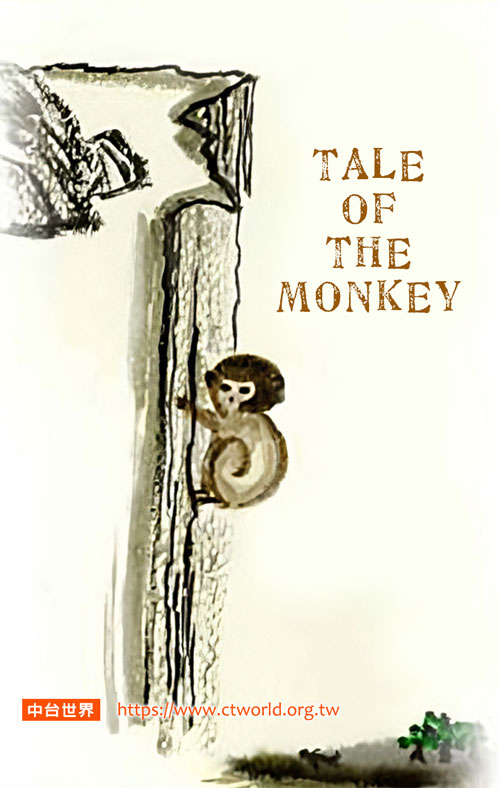
In a mountain long ago lived a monkey who was strong and wise, with a heart full of kindness. One day, while he was picking some fruit, he saw a hunter trapped at the bottom of a deep valley, crying for help. The monkey thought, “I have vowed to become a buddha and help all sentient beings. If I don’t save him, he will starve to death!”
He climbed down the precipice to reach the valley’s bottom. Then with the hunter on his back, he headed back up, deftly moving through rattans and bushes before finally reaching safe ground. Pointing the way for the hunter to leave the mountain, the monkey silently wished, “Once you leave here, I hope you will not kill animals as your career any longer.”
Out of breath, weak, and starving, the hunter thought, “If I don’t eat something I will never make it home. I must eat this monkey to regain my strength.” So he took a rock and bashed the monkey’s head in. The monkey was shocked and bled profusely before fainting next to a tree.
Despite the hunter’s treachery, the monkey managed to maintain a mind clear and free of hatred. Instead, he felt pity and compassion towards the hunter, thinking, “It is not yet time to change his evil ways. I hope he will someday meet the Buddha or a bodhisattva so he can learn the Dharma and never raise such evil thoughts again.”
The monkey was a previous incarnation of Shakyamuni Buddha.
REFLECTION
The wise and compassionate put the well-being of others before themselves, whereas the ignorant and selfish seek to satisfy their desires at the expense of others. During his many eons of cultivation, Shakyamuni Buddha always reacted to slander, insult, and injury with a mind of equanimity and tolerance, without a trace of resentment or a thought of revenge. The only thing that concerned him was if his enemies could one day be liberated from anger and hatred and attain buddhahood.
How can we use the Buddha’s example to reflect upon ourselves? If we are in the habit of arguing over trivial things, what can we do to be more concerned with the feelings and well-being of others? By performing self-reflection and changing our habitual patterns, we can live in harmony with all sentient beings.